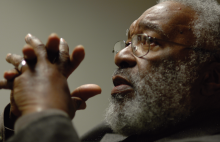faithful

In the summer of 430, the great Christian writer and bishop Augustine of Hippo lay dying as barbarians besieged his North African city – basically a mop-up operation in the slow-motion fall of the Roman Empire.
Today, in the fall of the year 2016, a lot of Christians can relate.

THE DOG DAYS OF SUMMER can make for a preaching desert without an oasis in sight. This can be a fine time to take a vacation from the lectionary. Huge swaths of scripture go untreated otherwise—the entire Samson cycle, most of the cursing psalms, most of the gospel of John. One friend spends a portion of every year preaching through blockbuster movies and how they intersect with the scriptures. Another devoted a preaching series to favorite children’s books.
Here in August the lectionary itself seems to take a vacation, visiting the discourse about bread in John’s gospel, inviting us to see every bit of bread, every bite of food, as filled with Jesus. Texts about water invite us to see all water as a sign of the God who creates us in the water of a womb and gives water for our salvation in baptism (an especially apt teaching point for those still sandy-toed from the beach).
A friend’s pulpit has on it “tree of life,” written in Hebrew—inviting all to see trees as reminders of the tree from which our first parents ate fruit forbidden to them, the tree on which Jesus was crucified, and the tree in the City of God whose leaves are for the healing of the nations.

I SAT MY two boys down the night I got the call and heard the news. “Uncle Vincent has died and passed on,” I told 15-year-old Luke and 11-year-old Jack.
I could see the sadness in their faces. Vincent Harding had been like an uncle to them, an elder and mentor to me, a formative retreat leader for the Sojourners community, and one of the most insightful commentators and historians of the true meaning of the civil rights movement and Martin Luther King Jr.
Dr. Harding and Dr. King were friends. Vincent and his wife, Rosemarie, were part of the inner circle of the Southern freedom movement, and Harding wrote the historic speech that King delivered at Riverside Church in New York City on April 4, 1967, where he came out against the war in Vietnam and identified the “giant triplets” of racism, extreme materialism, and militarism.
That speech was perhaps King’s most provocative and prophetic address. It reflected King’s heart and mind, and went further than he had gone before in challenging foundational and systemic wrongs in U.S. life and history and not merely calling for racial integration. This King—particularly in his thinking and writing from 1964 and the passage of the Civil Rights Act until 1968, the year of his assassination—was a King perhaps best understood by his speechwriter that day, Vincent Harding.
That’s what Vincent always did for us all: asked us to go deeper into our faith.

The University of Chicago recently performed an exhaustive survey of the beliefs of people in 30 countries around the world. There were a few surprises in it, and I also struggled a bit with the entire structure of the survey.
Though I knew there was a large (and growing) disparity between those claiming some faith in the United States and those attending a church, I fully expected that the number of die-hard faithful would be much lower. After all, a previous study some years ago by the Baylor Institute for the Studies of Religion found a direct correlation between church attendance and one’s confidence in the existence of God. It would be interesting to revisit that question, given these new results, to see if that trend is still happening, or if there’s a resurgence in American faith in God, regardless of the still-declining church numbers.

Imagine a Catholic Church that stopped catering to its tiny cadre of old male bishops and heard instead the cries of its people. Or a fundamentalist movement that stopped defending its franchise by nonsensical attacks on evolution and modernity, and instead took Scripture seriously.
Imagine a conservative Christian movement that dropped its relentless assault on women's rights and instead sought a fresh vision of family and values. Or a progressive movement that listened to people, rather than lecturing them.
Too many "providers" — in politics, business and religion — come across as having a low opinion of their constituents. People tend to be good judges of what matters to them. Voters know this recession better than their would-be leaders seem to know it. Believers seem to take their faith more seriously than those institutions that seek to enroll them as members.